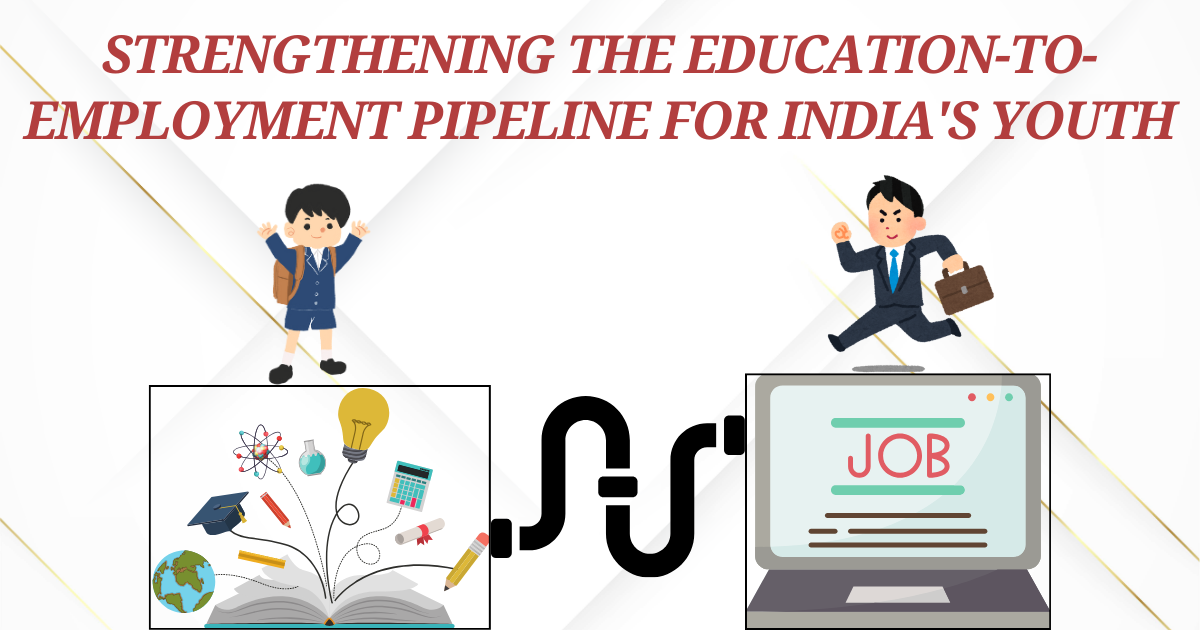Strengthening the Education-to-Employment Pipeline for India’s Youth. As you know, in India, there are so many unemployed people due to the increasing population and unskilled workers. Most of the youth are jobless and actively looking for jobs. Many people look for unskilled jobs, and many people look for skilled jobs. By comparison, unskilled jobs are easy to get. In this article, we will discuss the topic “Strengthening the Education-to-Employment Pipeline for India’s Youth”; please read it completely to get all the details.
Strengthening the Education-to-Employment Pipeline for India’s Youth
India has a large population and it is difficult to provide education and meaningful employment for all people. The potential of India’s youth talent will increase if they are offered the right education, the right skills, and the right opportunities for employment. Education creates a pathway for better and more meaningful employment. 700 million people or fifty per percent of our population, are now technology-savvy.

Many young Indians have understood the value of education for the best employment. The people who are uneducated get an unskilled labour job in which they have to do too much hard work, and the pay is very low. Whereas, in skilled labour, the workload is normal and the pay is good. The government is also emphasising education, as it is the key for a successful job. The New Education Policy (NEP) has been initiated by the government to educate individuals in India by addressing the evolving needs of the 21st century.
Methods of Strengthening the Education-to-Employment Pipeline
Modification of Curriculum
The education curriculum must be modified according to the employment needs, incorporating emerging technologies and emphasising practical application and critical thinking skills as necessary. The NEP has also brought in regulatory and transformative changes in curriculum and pedagogy to ensure students are developing higher-order cognitive skills, 21st-century skills, mathematical and computational thinking, critical thinking skills, among others.
Vocational Education and Training
Vocational Education and Training (VET) focuses on preparing learners for jobs that are based in manual or practical activities, traditionally non-academic and totally related to a specific trade, occupation or vocation, hence the term in which the learner participates. The Vocational training provides a pathway to success, is a high-demand skill, has greater satisfaction and high impact, and provides self-employment.
Enhancing Educators and Infrastructure
Before students, the educators must be provided proper education and training about the new methodologies of teaching and job-related knowledge. The infrastructure must be upgraded according to the new education curriculum, especially in rural areas for significant learning outcomes.
Promoting Digital Education Platforms
The students should be provided digital education and AI platforms that will help them study anywhere anytime. Emerging technologies like AI, machine learning, and data science are necessary for future employability. The digital education should also reach rural people and it should be free of cost for more people to access it. It will lead to more literate employment.
Promoting Entrepreneurship
Students must be taught about entrepreneurship in detail and helped to enhance their vision and start their own ventures. Most students do not have the proper knowledge about the starting and managing of a venture. Students must be provided knowledge about the business via workshops, seminars, and courses on topics such as business planning, marketing, and sales.
Challenges in Strengthening the Education-to-Employment Pipeline
Skills Gap: There are many individuals who have gained basic knowledge and think they are ready to do a job. But in present times, only academic knowledge is not enough. Employers want practical knowledge, industry-specific knowledge, and soft skills, such as communication, teamwork, leadership, decision-making, and problem-solving.
Quality of Education: The quality of education also matters in employment. The quality is not good in rural areas due to unqualified teachers and insufficient infrastructure. Reports have indicated that a significant percentage of teachers struggle with basic arithmetic, impacting the quality of learning.
Gender Inequality: Socio-cultural norms and insufficient resources have created several challenges for women to get quality education. Employment chances of women are less than men due to limited programmes and resources.
Weak Foundation: Without a strong foundation in literacy and numeracy, many young individuals find themselves ill-prepared to seize changes for advancement, sustaining cycles of inequality and limiting their potential for personal and professional growth. This shortage in foundational skills not only hinders individual aspirations but also undermines the nation’s group progress.
